Iranian Clerics Make Anti-Israel Remarks On Hamas-Israel War

A wave of anti-Israeli remarks came on Friday from authorities in Iran days after a surprise attack by Hamas on Israel that killed and injured thousands.

A wave of anti-Israeli remarks came on Friday from authorities in Iran days after a surprise attack by Hamas on Israel that killed and injured thousands.
Hassan Rouhani, the former Iranian president, has issued a statement condemning Israel for declaring an all-out war against Hamas in Gaza where the militant Hamas group has its base.
Rouhani said that the current situation highlights the “suffering” endured by the “people of Palestine” inflicted by Israel’s “Zionist Regime for the past 75 years.”
The state of Israel was established in 1948 and recognized by the United States at the same time.
“Censorship of the truth, one sided accounts of events, and political and media repression,” Rouhani mentioned as examples of what the Palestinian people have had to deal with.
The former President's remark contrast with the behavior of the Iranian regime that has denied basic freedoms to Iranians for 44 years. It has killed thousands of protesters in recent years and jailed tens of thousands of people, in addition to thousands who have been hanged.
Meanwhile, a representative of Iran’s ruler Ali Khamenei in the southwest province of Khuzestan has also issued remarks praising Hamas’s attacks on Israel.
Abdolnabi Mousavi-Fard claimed that any scene of Hamas fighters using violence against Israeli civilians is fabricated. “My regret is that some people think Israelis are innocent,” he added.
The Islamic Republic is the main supporter of Palestinian militant group such as Hamas, leading to speculation about Iran’s direct involvement in the October 7 attack.
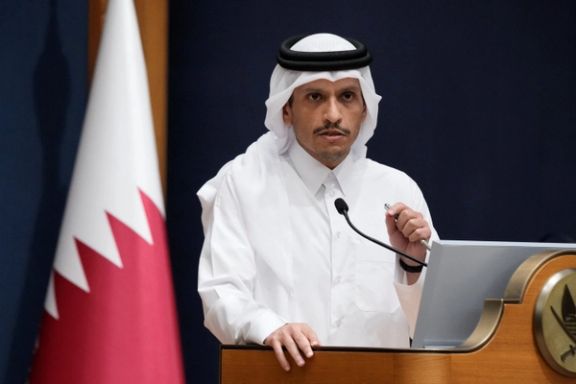
Updated - Qatar said on Friday that it is committed to fulfilling an agreement with Iran and the US on $6 billion in Iranian funds released into Qatari banks.
In a news conference with US Secretary of State Antony Blinken on Friday, Qatari Prime Minister Sheikh Mohammed Bin Abdulrahman al-Thani was asked if his government had agreed with the United states to freeze the funds that were released from South Korea in September, after the bloody attack by Hamas against Israel.
The Prime Minister in a somewhat vague answer in Arabic said, "Regarding the media reports about freezing Iranian funds in Qatar, the state of Qatar is always committed to any agreement, and every step must be done through consultations with other partners that fund – the money here in Qatar, is there. And Qatar will focus at the priorities of – need not do anything that will escalate the situation in the region."
The Washington Post reported on Thursday that US Deputy Treasury Secretary Wally Adeyemo had told House Democrats that the Biden administration and Qatar's government had reached a deal to re-freeze the funds in the light of events in the Middle East. Adeyemo reportedly said that after the October 7 bloody Hamas attack on Israel and the death of more than 1,000 civilians, the US and Qatar reached the deal to deny Iran the use of the funds for buying non-sanctionable goods.
CBS News called it a "quiet understanding", not a formal agreement
Iranian state news agency IRNA, however, reported on Friday that Qatar's Central Bank Governor Bandar bin Mohamed bin Saud Al Thani had denied the reports in a meeting with his Iranian counterpart Mohammad-Reza Farzin on the sidelines of the International monetary Fund summit in Morocco.
"The rumors about the refreezing of Iran's funds in Qatari banks were of no real value, and were more like a joke and media game," the Qatari official said, according to IRNA, which is the government's official news website.
He added that “Qatar is fully committed to all its obligations with Iran, and there is no obstacle to bolstering banking relations between the two countries.”
The Biden administration reached a hostage release deal in August to allow South Korea to unblock $6 billion of accrued Iranian oil income and transfer the money to Qatar in exchange for the release of five Americans held by Iran. The deal led to sharp criticism by Republicans, some Democrats and Iranian American activists, who labeled the released funds as “the biggest ransom payout in history”, which would embolden the Iranian regime and encourage hostage taking around the world.
A bipartisan bill has been introduced in the US Senate to stop the use of the funds by Iran. More than 100 House Republicans backed a bill to refreeze the $6 billion, lawmakers announced on Thursday.
“A month ago… the Biden Administration unfroze $6 billion and made it available to Iran,” said Congressman August Pfluger who introduced a bill to block Iran’s access to the fund. “This $6 billion will be used to backfill the money that Iran is paying to Hamas if we don’t act. Since the Administration refuses to permanently freeze the funds, Congress will.”
Republican Senator Joni Ernst on Friday told Fox News that "President Biden must immediately freeze the $6B that emboldened more of Iran’s proxy terrorism. End the appeasement."
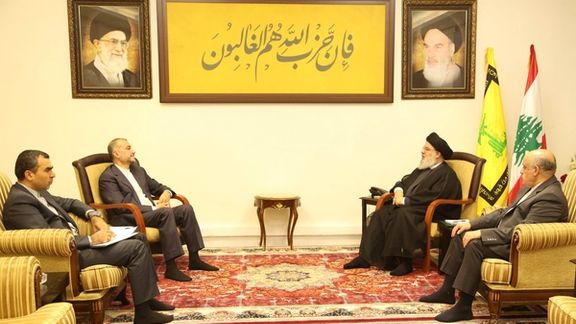
Iran's foreign minister on Friday warned of escalating violence in the Middle East if Israel’s attacks on the Gaza Strip don’t halt immediately.
Hossein Amir-Abdollahian and the head of militant Lebanese group Hezbollah, Hassan Nasrallah, met in Beirut to discuss the war that started last week after Hamas attacked Israel killing more than a thousand civilians and taking more than a hundred people hostage.
The foreign minister is on a tour of the region to meet with powerful militant groups in Iraq, Lebanon and Syria to mobilize support against long-time foe Israel.
Speaking to journalists after meeting with his Lebanese counterparts, Amir-Abdollahian said actions taken by Hamas over the weekend were in response to policies of Benjamin Netanyahu, the Israeli Prime Minister, an avid critic of the ruling clerical regime in Iran.
“If these organized war crimes that are committed by the Zionist entity don’t stop immediately, then we can imagine any possibility,” said Amir-Abdollahian.
The statement comes after both Iran’s ruler, Ali Khamenei, and President Ebrahim Raisi extended congratulatory remarks praising Hamas for its “courage and bravery” after their air land and sea attack on Israel.
Iran is a supporter of Hezbollah in Lebanon and Hamas in Gaza, though it has denied involvement in the recent attacks on Israel. The Washington Post and the Wall Street Journal have quoted sources who have said that Iran is complicit in the Hamas attacks.
The visit comes amid growing international concerns that the war could spread to Lebanon’s border and the wider Middle East given high animosity and tensions in the region.
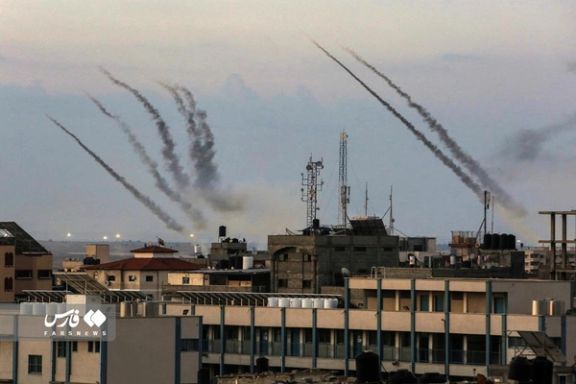
While Iran’s foreign minister speaks of new battle fronts against Israel, several lawmakers in Tehran boasted of assisting Hamas, echoing the regime's rhetoric.
Foreign Minister Hossein Amir-Abdollahian said on Thursday that the continuation of Hamas-Israel war will prompt a response from "the rest of the axis of resistance." The ‘resistance' front or axis is the term coined by the Islamic Republic to describe its logistic, financial and intelligence support for the Syrian regime, the Lebanese militant group Hezbollah, and dozens of militia groups in the region, several of which were created by Iran.
"This is just the beginning,” Iranian lawmaker Kamal Alipour told Didban Iran website, adding that “if the Supreme Leader orders, we will also have military support for Hamas." Referring to the Iraq-Iran war in the 1980s, he said that “Iran stood against Iraqi leader Saddam Hussein for eight years, therefore war against Israel is nothing in comparison to that.”
Alipour added, "Iran has provided consultation and military training to Hamas forces. Basically, the philosophical underpinning of our Islamic Revolution is to assist the oppressed and downtrodden people of Palestine."
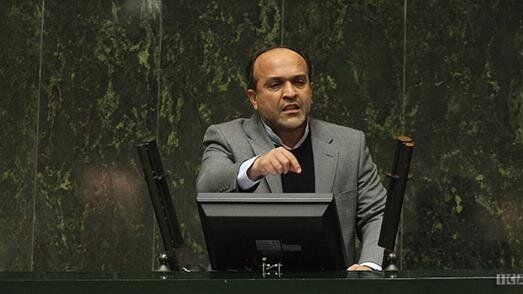
His remarks were echoed by another lawmaker, Shahriar Heydari, who emphasized that Iran has backed Hamas through military training and advisory support, claiming that due to the blockade of Gaza, “sending weapons from Iran is not possible but if such an opportunity were available, we would provide our utmost support... In terms of military training, we have been and will remain a source of assistance."
"We have trained the resistance forces and Hamas to use missile technology, but these technologies belong to the Palestinians and the fighters themselves," he claimed.
While the Islamic Republic is cheering about the war in Israel, Iranians’ reactions to the regime’s propaganda indicate a complex societal schism. Countless posts sympathetic to Israelis who have suffered the biggest loss of life in one day since the holocaust are promoting hashtags such as “Iranians Stand With Israel.”
Numerous social media posts are encouraging people loyal to the regime to travel to Israel and support Hamas in the battlefield, suggesting that this might be the most direct path to becoming revered "martyrs" in their revolutionary ideology.
Regime-sponsored rallies were also held on Friday across Iran in solidarity with the Hamas attack, praising the “miraculous and wonderful operation” that made “terror and fear engulf” Israel.
The Iranian foreign minister, in Beirut on a tour of Iraq, Lebanon and Syria, was received at the airport by top officials of Hamas, Islamic Jihad and Hezbollah. "Some Western officials have questioned if there is an intention to open a new front against the Zionist entity. Of course, in light of the continuation of these circumstances that are war crimes,” he said, referring to the displacement of Palestinians and cutting water and electricity to the Gaza Strip.
Western governments and media are questioning Iran’s role in the Hamas attack and its long-standing financial and military support for militant groups in the region. The Iranian foreign minister’s remarks push Tehran further to the forefront of the conflict.
Israel has been pounding Gaza in retaliation for the Hamas rampage in Israel this week that has killed well over 1,000 civilians, the deadliest attack on civilians in Israeli history. More than 1,500 Palestinians have been killed.
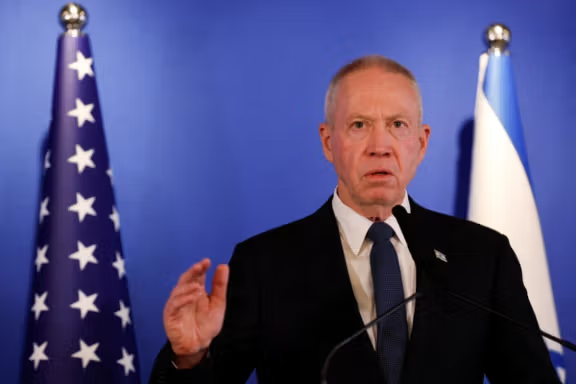
Hamas, Hezbollah and Iran form an “axis of evil”, Israeli Defense Minister Yoav Gallant said on Friday, as the army continued to pound Gaza.
Israel is waging all-out war on Hamas militants to effect permanent change and safeguard its future as a prosperous democracy, Gallant said on Friday, describing Hamas as part of an "axis of evil" with Iran.
The Iranian clerical regime has cheered and celebrated the Hamas terror attack that killed well over 1,000 Israeli civilians on October 7. According to estimates, Tehran has been providing at least $100 million annually to the Palestinian group.
Asked during a news conference with his US counterpart Lloyd Austin whether Tehran consented to the weekend Hamas onslaught from the Gaza Strip, Gallant said: "It doesn't matter ... (because) the idea is an Iranian idea."
As fighting raged into its seventh day, Gallant said Palestinian civilians "who want to save their lives" must heed Israel's warning to evacuate southward in the enclave - amid UN warnings that the humanitarian crisis there could spiral.
He declined, however, to answer a reporter's question on whether Israel - which has signaled that a ground invasion could follow its current air barrage on Gaza - would stick to the 24-hour evacuation notice it issued on Friday morning.
"This is a war for the existence of Israel as a prosperous state, as a democratic state, as homeland of the Jewish people," Gallant said.
"We are fighting for our home. We are fighting for our future," he said. "The path will be long, but ultimately I promise you we will win."

The European Parliament Thursday announced the finalists for this year’s prestigious Sakharov Prize that includes Mahsa Amini and the Woman Life Freedom Movement in Iran.
Last year, the death of Mahsa Amini, the 22-year-old Kurdish-Iranian woman while in police custody for improper attire, sparked one of the most widespread anti-government protests across the country. The crackdown on protests resulted in hundreds of deaths and thousands of arrests by authorities, according to human rights organizations.
The Woman Life Freedom Movement has gained international attention in support of Iranian women who have been enduring decades of oppression and enforced hijab by the Islamic Republic’s regime since 1979.
The Sakharov Prize is awarded each year by the European Parliament since 1988 to honor individuals and organizations that defend human rights and basic freedoms. The winning laureates for 2023 selected by the European Parliament will receive the prize in a ceremony in December in Strasbourg.
Previous recipients of the prize include Nelson Mandela and Malala Yousafzai, who also won the Nobel Peace Prize.
The shortlist is the latest show of recognition of the plight of Iranian women by the international community. Last week, jailed activist Narges Mohammadi was awarded the 2023 Nobel Peace Prize for what the committee called “her fight against the oppression of women in Iran and her fight to promote human rights and freedom for all.”
Meanwhile, days after the one-year anniversary of Mahsa Amini’s death in September, Iranian parliament passed a chastity and hijab bill to impose heavier penalties on women who do not follow the compulsory Islamic dress code.